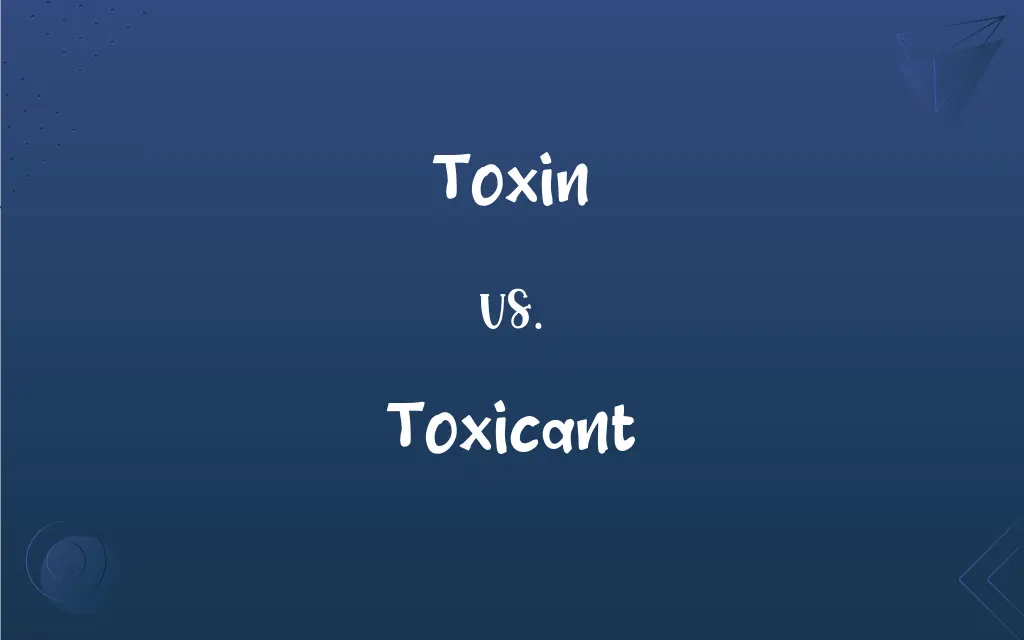Toxin vs. Toxicant: What's the Difference?
Edited by Aimie Carlson || By Janet White || Published on November 25, 2023
Toxin; A poison produced naturally by organisms. Toxicant; A man-made toxic substance.

Key Differences
Toxins are naturally occurring poisonous substances that are produced within living cells or organisms. They can be the byproducts of metabolic processes or serve as defense mechanisms. Toxicant: In contrast, toxicants are artificial or man-made toxic substances, often resulting from human activities or produced for specific purposes.
Toxins are often associated with plants, animals, fungi, and certain bacteria. For example, the venom in some snakes or toxins in certain mushrooms. Toxicant: Toxicants, on the other hand, are associated with industrial processes, agriculture, or are developed as drugs, pesticides, and other synthetic materials.
As a natural substance, toxins can play roles in ecological systems, influencing predator-prey dynamics or providing protection to the organism that produces them. Toxicant: Toxicants, being man-made, might not have a natural role in ecosystems and can sometimes pose environmental hazards.
While toxins are inherently dangerous at certain levels or concentrations, they are not always harmful, as they can have therapeutic properties or be harmless at low exposures. Toxicant: Similarly, not all toxicants are harmful at all concentrations; their impact largely depends on dose, exposure, and individual susceptibility.
The study of toxins, particularly those from animals or plants, is often termed "toxinology." Toxicant: The study of toxicants and their effects, especially in industrial or environmental contexts, falls under "toxicology."
ADVERTISEMENT
Comparison Chart
Origin
Naturally occurring
Man-made
Source Examples
Plants, animals, fungi, bacteria
Pesticides, drugs, industrial chemicals
Role in Nature
Can have ecological roles
Typically does not have natural roles
Study
Toxinology
Toxicology
Potential for Harm
Depends on concentration and exposure
Depends on concentration, exposure, and substance
ADVERTISEMENT
Toxin and Toxicant Definitions
Toxin
A naturally occurring poisonous substance.
Certain spiders produce a venom that contains a potent Toxin.
Toxicant
A man-made chemical that can cause harm to living organisms.
Pesticides are a common Toxicant found in agricultural areas.
Toxin
A substance derived from plants or animals that can cause harm.
Beware of the Toxin found in some wild berries.
Toxicant
A chemically synthesized agent harmful to living beings.
She wore gloves to handle the Toxicant safely.
Toxin
A biochemical produced by an organism that can be dangerous to others.
The pufferfish's Toxin makes it a risky delicacy.
Toxicant
A substance produced or introduced by humans that has toxic properties.
The spill contained a Toxicant that affected marine life.
Toxin
A harmful compound produced by a living organism.
The bacteria released a Toxin that caused the illness.
Toxicant
A synthetic poisonous substance.
The factory was found to be releasing a dangerous Toxicant into the river.
Toxin
A natural substance capable of causing disease or death.
Researchers study the Toxin in snake venom for potential medical applications.
Toxicant
An artificial compound with potential adverse health effects.
Industries must regulate their release of Toxicants into the environment.
Toxin
A poisonous substance, especially a protein, that is produced by living cells or organisms and is capable of causing disease when introduced into the body tissues but is often also capable of inducing neutralizing antibodies or antitoxins.
Toxicant
A poison or poisonous agent.
Toxin
A poisonous or harmful nonbiological substance, such as a pollutant.
Toxicant
Poisonous; toxic.
Toxin
(strictly) A toxic substance, specifically a poison produced by the biological processes of organisms.
Toxicant
Capable of causing damage or dysfunction by toxicity; (broadly) poisonous.
Toxin
Synonym of toxicant: a toxic substance in a body requiring removal.
Toxicant
A toxic or poisonous substance.
Toxin
A poisonous product formed by an organism, such as a pathogenic bacterium, a plant or an animal, usually having a high molecular weight, often a protein or a polysaccharide, but occasionally a low-molecular weight agent such as tetrodotoxin.
Toxicant
A poisonous agent or drug, as opium; an intoxicant.
Toxin
A poisonous substance produced during the metabolism and growth of certain microorganisms and some higher plant and animal species
Toxicant
Having the qualities or effects of a poison
FAQs
What's a Toxicant?
A Toxicant is a man-made toxic substance.
Are all Toxicants synthetic?
Yes, Toxicants are typically man-made or synthetic substances.
Can Toxicants be found in everyday products?
Yes, some household products can contain Toxicants, hence the need for proper handling and storage.
Are venom and Toxin the same?
Venom is a secretion containing one or more Toxins, used by some animals as a defense or to capture prey.
How can I protect myself from Toxicants?
Reduce exposure, use protective equipment, and follow safety guidelines when handling potential Toxicants.
What is a Toxin?
A Toxin is a naturally occurring poisonous substance produced by living organisms.
Can a Toxin be non-toxic at low levels?
Yes, the toxicity of a Toxin often depends on dose and individual susceptibility.
What's a common source of Toxicants?
Industrial processes, pesticides, and certain drugs are common sources of Toxicants.
Where might I encounter a Toxicant in daily life?
In products like cleaning agents, pesticides, or even in polluted air or water.
Are all Toxins harmful?
Not necessarily; the effect of a Toxin depends on its concentration and exposure.
Can prolonged exposure to a low-level Toxicant be harmful?
Yes, chronic exposure to a Toxicant, even at low levels, can lead to health issues.
Are all Toxicants harmful to humans?
The harm caused by a Toxicant depends on its nature, dose, and individual susceptibility.
Can Toxins be found in food?
Yes, some foods can contain natural Toxins, like certain mushrooms or fish.
Can Toxins have therapeutic uses?
Yes, some Toxins, in controlled doses, are used for medical treatments.
What's the study of Toxins called?
The study of Toxins, especially from living organisms, is termed "toxinology."
Are there regulations controlling Toxicant emissions?
Yes, many countries have regulations to control the release of Toxicants into the environment.
Do Toxins play a role in ecosystems?
Yes, Toxins can influence ecological dynamics, such as predator-prey relationships.
Can animals produce Toxins for defense?
Absolutely, many animals produce Toxins as a defense mechanism against predators.
Do plants produce Toxins?
Yes, some plants produce Toxins as a defense mechanism against herbivores.
Why are some Toxicants added to products?
Toxicants, like preservatives, might be added to enhance product shelf life or performance.
About Author
Written by
Janet WhiteJanet White has been an esteemed writer and blogger for Difference Wiki. Holding a Master's degree in Science and Medical Journalism from the prestigious Boston University, she has consistently demonstrated her expertise and passion for her field. When she's not immersed in her work, Janet relishes her time exercising, delving into a good book, and cherishing moments with friends and family.
Edited by
Aimie CarlsonAimie Carlson, holding a master's degree in English literature, is a fervent English language enthusiast. She lends her writing talents to Difference Wiki, a prominent website that specializes in comparisons, offering readers insightful analyses that both captivate and inform.

































































